|
Dusty Dog Reviews The whole project is hip, anti-academic, the poetry of reluctant grown-ups, picking noses in church. An enjoyable romp! Though also serious. |

|
Nick DiSpoldo, Small Press Review (on Children, Churches and Daddies, April 1997) Children, Churches and Daddies is eclectic, alive and is as contemporary as tomorrow’s news. |
Volume 207, April 2010
The Unreligious, Non-Family-Oriented Literary and Art Magazine
Internet ISSN 1555-1555, print ISSN 1068-5154

see what’s in this issue...
Note that in the print edition of cc&d magazine, all artwork within the pages of the book appear in black and white.
|
Order this issue from our printer as a a $7.47 paperback book (5.5" x 8.5") perfect-bound w/ b&w pages |

poetry
the passionate stuff
Garment DistrictJe’free
In the freezing January rain,
|


SettlingGreg Moglia
I settled for my ex
Anyway, I’d fall for any woman with any interest
I don’t want to be someone you’re settling for says the male lead in
I think of her hero, my father-in-law the handyman deluxe – plumbing, woodwork, painting... I did think you would be a good father
And if I looked hard at her I would have seen A good father
|
BIO SKETCHGreg Moglia is a veteran of 27 years as Adjunct Professor of Philosophy of Education at N.Y.U. and 37 years as a high school teacher of Physics and Psychology. His poems have been accepted in over 100 journals in the U.S., Canada and England as well as five anthologies. He is five times a winner of an Allan Ginsberg Poetry Award sponsored by the Poetry Center at Passaic County Community College. His poem ‘Why Do Lovers Whisper?’ has been nominated for a Pushcart Prize 2005. He has been nominated by the College of William and Mary for the University of Virginia anthology BEST NEW POETS OF 2006. He lives in Huntington, N.Y.
|
Haiku (wind)Robert Lawrence
Is that the ocean?
|


art by Eric Bonholtzer
Somewhere Between Flores and El RemateAmber Foster
You’re a foreigner. Where are you from? American! And traveling alone? Most foreigners are afraid to take the local buses. I would be afraid. In fact, I wouldn’t be traveling alone myself except I didn’t have any other choice. Usually my son, or his wife, takes me. They own a car dealership, very successful. But they couldn’t drive me today.
|
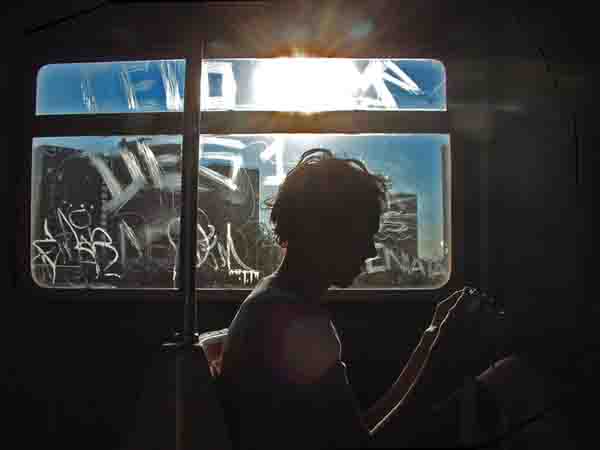
NYC, art by Christine Sorich
More Believable That WayJanet Kuypers12/01/09
I walked through the empty cathedral
good thing they pained him so tall
I mean, you need a big sign
good thing they pained him so tall
and it’s easy to make him
|
exhalingJanet Kuypers11/18/09
I’m exhaling cigarette smoke
This poem can be found on
|
| the Janet Kuypers poem Exhaling live at the Café in Chicago 04/06/10 |

Watch this YouTube video live at the Café in Chicago 04/06/10 |

Watch this YouTube video live at Cana-Dixie to Chi-town 12/15/09 |
TranslationJanet Kuypers11/18/09
This is only a translation.
This poem can be found on
|
| the Janet Kuypers poem Translation live at the Café in Chicago 04/06/10 |

Watch this YouTube video live at the Café in Chicago 04/06/10 |

Watch this YouTube video live at Cana-Dixie to Chi-town 12/15/09 |
Darwin & JesusCJ Wilson 2009
Darwin was kinder than jesus
|
| read from cc&d magazine, the April 2010 issue (v207) cc&d Editor in Chief Janet Kuypers reading the poem by CJ Wilson: “Darwin & Jesus” |
|
live at the Café in Chicago 04/06/10 |
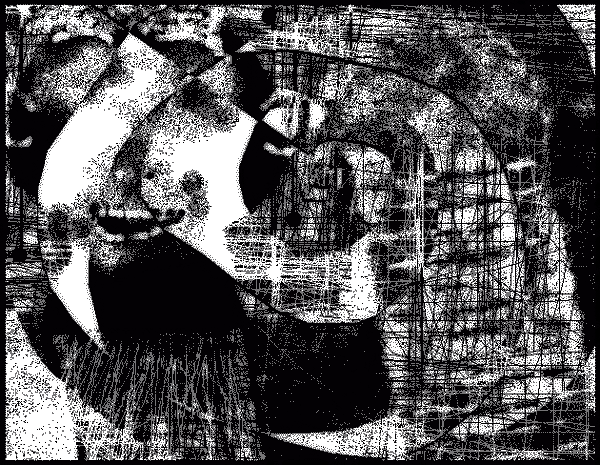
Suicide is Murder, art by Peter Schwartz
Flat OutPaul Handley
Musical ability is out
It’s the cars with unserviced
Take that, Dad mutters.
His careening laugh causes
|
guilty among my rosesDerek Richards
jillian calls their daughter long-distance
|
About Derek RichardsAfter performing both music and poetry around the Boston area for twenty years, Derek Richards shed his fear of rejection and began submitting his work this past August. So far his poetry has appeared in over thirty publications, including; Lung, Word Riot, Cantaraville, Soundzine, The Centrifugal Eye, Opium 2.0, Splash of Red, Calliope Nerve, Right Hand Pointing, Breadcrumb Scabs, Tinfoildresses, Poets Ink, The Foundling Review and Underground Voices. He has also been told to keep his day job by Quills and Parchment. His dog, cat and two ferrets admire his attempts to be honest, direct, brilliant and lucrative. Also, he wants you to know that he has compiled over 50 fantasy sports championships. Happily engaged, he resides in Gloucester, MA, cleaning windows for a living.
|
from Book of Corporate PrayerMichael Ceraolo
Our Pharma, who art on Wall Street,
|
| read from cc&d magazine, the April 2010 issue (v207) cc&d Editor in Chief Janet Kuypers reading the poem by Michael Ceraolo: “from Book of Corporate Prayer” |
|
live at the Café in Chicago 04/06/10 |

World’s Largest, art by Peter Bates
You can also find his artwork at PixelPost
Doomed to Repeating RiflesCEE
If I was Hitlerian
|
| read from cc&d magazine, the April 2010 issue (v207) cc&d Editor in Chief Janet Kuypers reading the poem by CEE: “Doomed to Repeating Rifles” |
|
live at the Café in Chicago 04/06/10 |
the Warhol Exhibit (God)CEE
My guess would be
|
The Last ChapterJosh Oldham
As you close your eyes
|

It Says Nothing, art by the HA!man of South Africa
They Left BecauseMaya Gurarie
#60 No one knew her name. The medics found out she was pregnant.
|
No ManSarah Ahmad
Firing the slime of dread
Watching the horrors fumigate the living
Shuffle and scoff the murky courage
Calling out to the afflicted trench
|
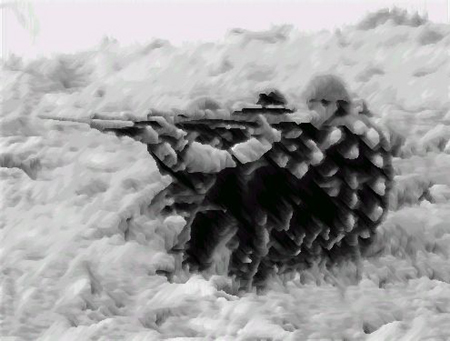
Ready, Aim, Shoot, art by Mark Graham
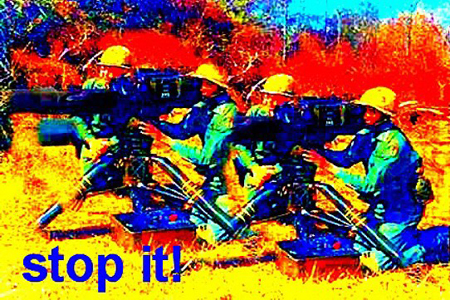
Stop It, art by Mark Graham
jobbedCharlie Newman
I get on the bus and close my eyes.
|
| read from cc&d magazine, the April 2010 issue (v207) cc&d Editor in Chief Janet Kuypers reading the poem by Charlie Newman: “Jobbed” |
|
live at the Café in Chicago 04/06/10 |

image of Charlie Newman,
photographed by John Yotko

prose
the meat and potatoes stuff
If I Should Die Before I WakeRonald Brunsky
Was life eternal like the universe and time? Would our souls continue on forever, or were we relegated to this one shot?
Moving back to Appleton brought back many memories of his youth, most were unpleasant.
After a long weekend in which Steve wrapped up some business in New York, he arrived at his desk. He made assignments for his reporters and checked his mail.
Steve, intrigued by the story, agreed to look into the situation. He went to the nursing home and interviewed the reverend and the doctors who supervised the hibernation process. He found out that it was top secret, and nobody was discussing it.
In the interview, the reverend first describes events similar to other “Life after Death” experiences already documented. Like: the light at the end of the tunnel, etc.
Steve was impressed with the overwhelmingly sincere delivery by Reverend Finsterwald, and noticed no indication of mental problems or disorientation.
Armed with this interview and the secrets of the new cryogenic storage process, Steve first thought about selling the story to some tabloid magazine. Eventually, however the reverend and his daughter convinced him that this story could serve a much greater purpose.
After several meetings with the evangelist, Steve felt comfortable enough to confide in him. His personal secret, which only a few of his closest friends knew, needed to be told to someone he respected — someone who could give him advice, and end his personal torture.
To get the ball rolling, Steve knew he must first sell the reverend’s story to the American public. His connection with the media made it easy to set up several talk show appearances. This effectively stirred up some interest, but without some way to substantiate the story it quickly went the way of crop circles and alien abductions. Interest faded, and Steve knew he needed the media to take him seriously.
They had a sunny forecast as the designated weekend arrived. The team armed with shovels and metal detectors gathered at the coordinates given by the reverend, and then slowly searched in an ever growing circular pattern.
The bones they found were more than enough for an accurate DNA test, but it was ten long days before the report came back.
Within the month they appeared on the two top rated talk shows. Steve not only mentioned the finding of the reverend’s father, but told of his plans to locate the remains of famed aviator Victor Corrigan.
As interest and support grew for the “Afterlife Movement”, a gathering opposition composed of conservative politicians and religious leaders both traditional and extreme.
The opposition came up with a counter plan. With some clever twisting of the truth that would have made any defense attorney proud, they argued that this only proved Reverend Finsterwald was a prophet — a psychic who had a true gift for solving earth bound mysteries, but in no way did it confirm that his version of the afterlife was correct. In an instance, they had taken the proof of victory away from the “Afterlife Movement”.
Steve stopped at a small motel outside of Harrisburg. He was just too worn out to drive any further. A good night’s sleep was definitely in order. Tomorrow would be a big day. Would he still have a job at the Appleton Gazette? His name and his sexual preferences were now common knowledge throughout the country. Why would a small town newspaper in the Midwest want a gay editor?
Losing the editor’s position turned out to be a blessing, Steve was now free to write on whatever subjects he wanted, without having to please a board of directors. He retold his experiences with the reverend in his first book, titled “If I Should Die Before I Wake”, which turned out to be a best seller. He received letters and e-mails by the thousands from people whose lives had been changed after reading the book. The Afterlife Movement had not been a failure; it was an on-going success.
|
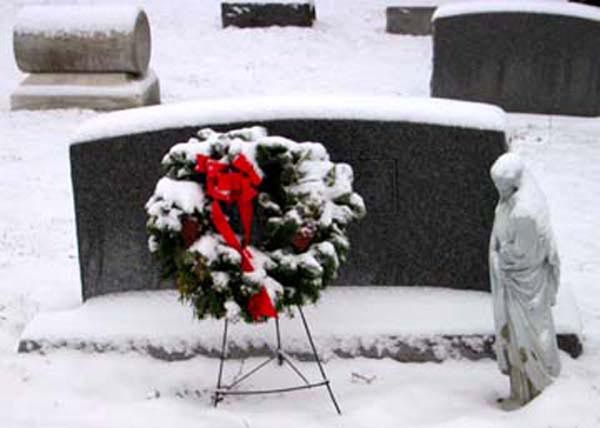
Graveyard Wreath, art by Cheryl Townsend
ParanoiaMel Waldman2084
“Kill the traitor!” the Chief, a 7-foot-monolith, commanded.
Like Bronson, Sampson was a senior agent. He was also the Chief of Psychiatry at the Institute of Trust. A mole had penetrated the Agency. He and Bronson had searched for the traitor for the past three weeks to no avail. Now, the shrink was the primary suspect. Of course, he did not know that he was a suspect or that he had already been found guilty and sentenced to death.
Deputy Chief Johnson limped into the Chief’s luxurious office, as vast as a grand ballroom, on the 200th floor of the Trust Foundation building. The walls were snow-white and lined with flowing red and blue bookcases. After midnight, the alien slithered into the catacombs, removed his mask, and shrieked relentlessly into the dark void. Soon It would rule with absolute power.
The Institute of Trust was the entire 6th floor of the Trust Foundation building. Sampson’s office was located in Room 66, a labyrinthine universe of dark secrets.
Wearing a human mask, the alien entered the mammoth office.
|
BIOMel Waldman, Ph. D.
|
KristyJulia O’Donovan
I was nineteen when given my first anti-depressant due to extreme depression. I was on it for awhile and my doctor felt I was not responding to it well. He wanted to put me on a therapeutic dose which would require hospitalization on a psychiatric ward. I was rather reclusive and unresponsive those first few days and it was then I first saw her. She walked into the room we ate our meals in and then used as entertainment for card games or to just socialize. She was blond, wearing a vertical black and white night gown and white socks. I knew right away we would not get along.
|
|
Watching The Princess Hurt
Sitting in the corner
Tell me who it is
Your eyes far away
Was it the rose
Just once you wished
He took the fantasy world
Is there anything
|
|
I don’t recall the conversations we had, I just recall having a lot of fun and if you are having fun on a psychiatric ward, you are not dealing with your issues as to why you are there in the first place. The one conversation I do remember is after her discharge date was set. As it loomed closer we exchanged addresses and phone numbers and both admitted when we first saw each other were sure we would not get along. The day Kristy left was very emotional. Her family waited between the Nurse’s station and the elevators while Kristy clung to me sobbing. She tried going to her family only to turn around and hold onto me again sobbing. She seemed so helpless I got a tissue and held itto her nose so she could blow. I did that twice. Her family was getting impatient and she had to go. I watched the elevator doors close and lingered a moment. It was winter and I often wore a flannel robe over my t-shirt and jeans. That’s the last I had any contact with her. I did a people search on her and think I found her. I tried to contact her but heard nothing. I guess she does not want to be found.
|
Somewhere Between Flores and El RemateAmber Foster
You’re a foreigner. Where are you from? American! And traveling alone? Most foreigners are afraid to take the local buses. I would be afraid. In fact, I wouldn’t be traveling alone myself except I didn’t have any other choice. Usually my son, or his wife, takes me. They own a car dealership, very successful. But they couldn’t drive me today.
|
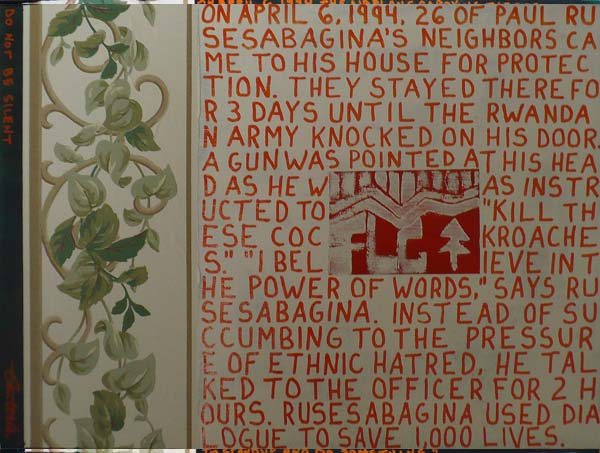
Do Not Be Silent, Linoleum Block Print by Aaron Wilder
FortunateJon MinsloffReed admired Jasmine’s ass as she walked over to Clevis. Her cheeks were round, and knew from plenty of practice how to bounce to the techno beat when she walked. They tensed up when she bent over and leaned into Clevis. Clevis sat in a wobbly chair with his hands in his short pockets on his chubby thighs, smacking on what Reed knew was at least his second slim-jim. Clevis stared blankly into the dark through gold colored wire-rimmed glasses. Reed watched him, hardly able to make out his eyes because of the glare from the spotlight hitting the thick lenses on Clevis’ spectacles. Reed sat there, puffing on his cigarette, since there wasn’t really much else to do with it. He held it in his hand, examining it as he exhaled a sigh of smoky air and thought about everything besides cancer, besides death.
Reed looked around the room, checking out the crowd, looking for action. His eyes got caught on some messages that had been scratched into the old wooden table where he was sitting. GINA LOVES TODD was carved into the cheap, soft wood except TODD was exed out and TO FUCK MIDGET NINJAS was written beside it. Reed got a little excited because he took karate in second grade. But that’s probably not enough. Besides, he thought TODD would most likely get mad if he knew GINA was into him. Just in case, Reed grabbed the knife from the silverware set. The utensils were wrapped in a crimson napkin, which was folded carelessly in a trash-ass attempt at an origami flower. A pretty orchid. He wrote REED WAS NOT HERE, cutting into the glossy finish with the stainless steel blade. The S, which he found a bit hard to carve out, looked more like a lightning bolt than anything else. He moved to another table, near the back, a little farther from the stage and pervert row.
Reed was stuck out for the night with Clevis, bored, sipping on a White Russian, and wishing his manly friends were there so they could talk about animals. He turned to see what Jasmine was up to, if she got Clevis to pay for a lap dance. It looked like they were just talking. She was seated next to Clevis, facing him, really engaged. Reed was surprised that anyone would actually find the kid interesting. He’s probably talking about the chick in the office at work that he’s in love with but ignored by, or bragging about how many grapes he could fit into his mouth at once. 27. Or maybe he was being funny, because Jasmine was laughing and reaching out with her hand, gently touching his forearm. Techno thumped in the background and made Reed think about Morse code.
“Ohh YEeaahhhah! This is awesome!!!” Clevis seemed to be enjoying his first lapdance he was getting. Reed watched from the back of the room. To him it looked like the stripper was getting into the whole thing as much as Clevis was. The girl bobbed up and down with her ass between Clevis’ thighs and tossed her hair over when she swung her head, releasing dark curls that sprang out in every direction. Her necklace spun around her neck, at times gaining dangerous speed. She then turned around and leaned over Clevis, placing her slender, toned arms around him and supporting her weight with the back of his chair. She released onto only one arm and pulled Clevis’ face into her sweaty chest with her free hand. Her necklace was left dangling between the two of them. From his seat, Reed could almost see Jesus dancing right before Clevis’ eyes.
Reed shook his head as he stood there lighting a cigarette. Through the dimmer of smoke he watched, squinting, as the girls body transformed into a mysterious silhouette.
|
SniperBob Strother
Benny had watched the old woman for weeks. She was one of a number of elderly widows living in Chicago’s Albany Park, a crumbling neighborhood made up primarily of Swedish and Russian immigrants. Her house, wedged narrowly between boxwood hedges, was a two-story yellow frame with peeling paint. Time and sun had faded the trim over the years, bathing the entire structure in the washed-out tones of an old photograph. The place’s most remarkable feature lay behind the picket fence separating the property from the sidewalk: colorful flowers, every hue of the rainbow, and lush green foliage blanketing the small, but well-cared-for yard. The colors reminded Benny of the pages in his collection of Avengers comic books.
The moon was bright when Benny returned to his spot by the alley and surveyed the street. That was good because it meant he’d have some light to see by, and he could minimize the use of the small Maglight he’d stuffed into the back pocket of his jeans. The post-midnight neighborhood was quiet as a cemetery, nothing moving, no porch lights glowing, no traffic. He moved out of the shadows, crossed the street, and opened the picket fence gate. His rubber-soled shoes made no sound as he tiptoed up the steps and listened at the front door. Benny felt the adrenalin pumping through his veins as he slipped the pry bar between the door and the doorframe and applied slow, steady pressure.
|
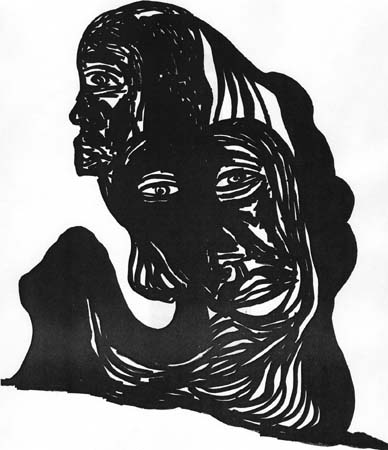
to Ponder, art by Edward Michael O’Durr Supranowicz
Good EatsC.P. Jones
“C’mon girl! Why do you spend so much time putting make-up on? It don’t make no difference anyhow, you know that.” Frannie’s mother yells at her through the bathroom door.
Once again Frannie is in the bathroom standing in front of the mirror thinking if this is really happening.
“He’s slummin’ He just wants to get his dick wet tonight.”
How did I end up here? We ate our food and started driving and the next thing I know we are parked on a ledge overlooking the town. Frannie thought.
Capped and gowned students fill the football field. Some look hopeful, some look scared, and most look bored. The football field is a sea of blue with seniors milling about with cameras taking pictures of each other. Overtures and promises of staying in touch fill the air. By the end of the summer the promises will be broken with everyone going their separate ways. Just like the graduating class before them, and before that. Nothing ever changes.
Welcome to Good Eats “Haute Cuisine In A Diner Atmosphere” Menu De Jour Appetizers Sautéed’ Mushroom Caps with Capers $9.95 Deep Fried Calamari with Marinara Dipping Sauce $11.95 Entrees Crown Roast of Lamb with Mint Jelly $17.95 Cornish Game Hen with Orange Butter Saffron Glaze $14.95 Sides Sautéed’ Fresh Green Beans with Parmesan Cheese $7.95 Shitake Mushroom Wild Rice $8.95 Desert Cinnamon Poached Bosc Pear in a Fresh Strawberry Glase’ $7.95 Sommelier Wine Suggestions 2006 Napa Valley Robert Mondavi Unfiltered Pinot Noir $46.00 2007 Sonoma Bonny Doon Chardonnay $34.00 Corkage Fee: $15.00 Reservations Encouraged Bon Appétit’ Catering Available Owner/Manager: Ms. LaCharite
Donnie and his wife are outside the entrance to the newest restaurant in town. They look over the posted menu.
I hate this town and everyone in it.
Wilson High School 25th Anniversary Reunion Special Menu Appetizers Deep Fried Porcini Mushroom Stuffed Hush Puppies Deep Fried Monterey Pepper Jack Cheese Sticks with Buffalo Ranch Dipping Sauce Entree’ Buttermilk Marinated Fried Chicken Deep Fried Tri-Pepper Seasoned Steak Fries Sautéed Vermicelli and Rice Pilaf Desert Deep Fried Ice Cream Scoops in Fresh Waffle Cones Choice of Flavors: Vanilla, Chocolate, or Strawberry Open Bar Welcome Alumni
Donnie and Maureen are standing outside GoodEats looking at the menu for tonight’s dinner.
“Your puff pastry was filled with a cancerous tumor removed from my lower intestine. It took a lot of red food dye and sugar cover up the black color and foul taste. Oh and a dash of passion fruit puree”
|

"Glass Figure YUNA, art by Junior McLean
The MishapHudson Kerr
Lara knew she shouldn’t have made a stop to get coffee, but she was tired and partly addicted to having something keep her going. She had less than an hour to make it across town to pick up her son or the day care would charge her by the hour. She hated uptown day care systems, but it was the cheapest thing near her job. Come on, she thought, as the happy cashier took her money.
|
OxygenWilliam Locke Hauser
The infection had finally been cured, the doctor said. “Your lungs will never be strong, Mrs. Maxwell, but there’s no reason you can’t live to a ripe old age.”
On Tuesday, he returned to his office after an excellent lunch. “Any calls, Melissa?”
|
William Locke Hauser bioWilliam Locke Hauser, after military and business careers, is engaged in a “third career” of writing fiction. Eighteen of his stories have been published, notably in AntiMuse (Best in Show Fiction, 2006) and Writers’ Forum (first prize, Summer 2007 contest); and, most recently, in Mobius (March 2009). He and his wife Helen Alexandra, an entrepreneurial businesswoman, live in Fort Lauderdale, Florida.
|
End PointKaye Branch
“Honey, just get on the couch,” Mary, Simon’s aide, told Lisbeth. “Relax. Shh-shh.” **
Before the hospital bed, there was the hotel room bed. **
“It would have been a ga-url,” a nurse with a thick Boston accent said, standing at the nurses’ station. Allegedly, nurses were some of the busiest people on Earth, yet this group bucked the trend, finding time to gossip on the clock, with Lisbeth in earshot.
|
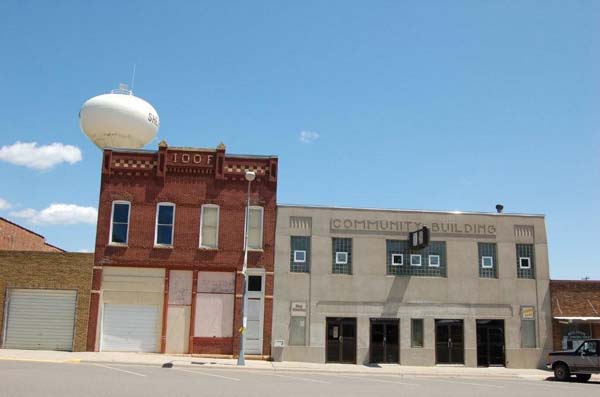
Summer 2007 #113, art by David Thompson
GENESIS 4Dan Lewandowski
“Good evening,” Ms. Johnson said to her class, noting that tonight’s turnout was lower than last week’s, which was lower than that of the week before. This disappointed but hardly surprised her. Over time the effectiveness of any threat of punishment diminishes if it isn’t backed up with action. And everybody knew the cops weren’t about to waste time chasing after people – mostly kids – who defied court orders to attend parenting classes.
|

Debra Purdy Kong, writer, British Columbia, Canada I like the magazine a lot. I like the spacious lay-out and the different coloured pages and the variety of writer’s styles. Too many literary magazines read as if everyone graduated from the same course. We need to collect more voices like these and send them everywhere.
Children, Churches and Daddies. It speaks for itself. Write to Scars Publications to submit poetry, prose and artwork to Children, Churches and Daddies literary magazine, or to inquire about having your own chapbook, and maybe a few reviews like these.
what is veganism? A vegan (VEE-gun) is someone who does not consume any animal products. While vegetarians avoid flesh foods, vegans don’t consume dairy or egg products, as well as animal products in clothing and other sources. why veganism? This cruelty-free lifestyle provides many benefits, to animals, the environment and to ourselves. The meat and dairy industry abuses billions of animals. Animal agriculture takes an enormous toll on the land. Consumtion of animal products has been linked to heart disease, colon and breast cancer, osteoporosis, diabetes and a host of other conditions. so what is vegan action?
We can succeed in shifting agriculture away from factory farming, saving millions, or even billions of chickens, cows, pigs, sheep turkeys and other animals from cruelty. A vegan, cruelty-free lifestyle may be the most important step a person can take towards creatin a more just and compassionate society. Contact us for membership information, t-shirt sales or donations.
vegan action
Children, Churches and Daddies no longer distributes free contributor’s copies of issues. In order to receive issues of Children, Churches and Daddies, contact Janet Kuypers at the cc&d e-mail addres. Free electronic subscriptions are available via email. All you need to do is email ccandd@scars.tv... and ask to be added to the free cc+d electronic subscription mailing list. And you can still see issues every month at the Children, Churches and Daddies website, located at http://scars.tv
MIT Vegetarian Support Group (VSG)
functions: We also have a discussion group for all issues related to vegetarianism, which currently has about 150 members, many of whom are outside the Boston area. The group is focusing more toward outreach and evolving from what it has been in years past. We welcome new members, as well as the opportunity to inform people about the benefits of vegetarianism, to our health, the environment, animal welfare, and a variety of other issues.
Dusty Dog Reviews: These poems document a very complicated internal response to the feminine side of social existence. And as the book proceeds the poems become increasingly psychologically complex and, ultimately, fascinating and genuinely rewarding.
Dusty Dog Reviews: She opens with a poem of her own devising, which has that wintry atmosphere demonstrated in the movie version of Boris Pasternak’s Doctor Zhivago. The atmosphere of wintry white and cold, gloriously murderous cold, stark raging cold, numbing and brutalizing cold, appears almost as a character who announces to his audience, “Wisdom occurs only after a laboriously magnificent disappointment.” Alas, that our Dusty Dog for mat cannot do justice to Ms. Kuypers’ very personal layering of her poem across the page.
Fithian Press, Santa Barbara, CA Indeed, there’s a healthy balance here between wit and dark vision, romance and reality, just as there’s a good balance between words and graphics. The work shows brave self-exploration, and serves as a reminder of mortality and the fragile beauty of friendship.
Mark Blickley, writer You Have to be Published to be Appreciated. Do you want to be heard? Contact Children, Churches and Daddies about book or chapbook publishing. These reviews can be yours. Scars Publications, attention J. Kuypers. We’re only an e-mail away. Write to us.
The Center for Renewable Energy and Sustainable Technology The Solar Energy Research & Education Foundation (SEREF), a non-profit organization based in Washington, D.C., established on Earth Day 1993 the Center for Renewable Energy and Sustainable Technology (CREST) as its central project. CREST’s three principal projects are to provide: * on-site training and education workshops on the sustainable development interconnections of energy, economics and environment; * on-line distance learning/training resources on CREST’s SOLSTICE computer, available from 144 countries through email and the Internet; * on-disc training and educational resources through the use of interactive multimedia applications on CD-ROM computer discs - showcasing current achievements and future opportunities in sustainable energy development. The CREST staff also does “on the road” presentations, demonstrations, and workshops showcasing its activities and available resources. For More Information Please Contact: Deborah Anderson dja@crest.org or (202) 289-0061
Dorrance Publishing Co., Pittsburgh, PA want a review like this? contact scars about getting your own book published.
 The magazine Children Churches and Daddies is Copyright © 1993 through 2010 Scars Publications and Design. The rights of the individual pieces remain with the authors. No material may be reprinted without express permission from the author. 
Okay, nilla wafer. Listen up and listen good. How to save your life. Submit, or I’ll have to kill you.
Dorrance Publishing Co., Pittsburgh, PA: “Hope Chest in the Attic” captures the complexity of human nature and reveals startling yet profound discernments about the travesties that surge through the course of life. This collection of poetry, prose and artwork reflects sensitivity toward feminist issues concerning abuse, sexism and equality. It also probes the emotional torrent that people may experience as a reaction to the delicate topics of death, love and family. “Chain Smoking” depicts the emotional distress that afflicted a friend while he struggled to clarify his sexual ambiguity. Not only does this thought-provoking profile address the plight that homosexuals face in a homophobic society, it also characterizes the essence of friendship. “The room of the rape” is a passionate representation of the suffering rape victims experience. Vivid descriptions, rich symbolism, and candid expressions paint a shocking portrait of victory over the gripping fear that consumes the soul after a painful exploitation.
Dusty Dog Reviews (on Without You): She open with a poem of her own devising, which has that wintry atmosphere demonstrated in the movie version of Boris Pasternak’s Doctor Zhivago. The atmosphere of wintry white and cold, gloriously murderous cold, stark raging cold, numbing and brutalizing cold, appears almost as a character who announces to his audience, “Wisdom occurs only after a laboriously magnificent disappointment.” Alas, that our Dusty Dog for mat cannot do justice to Ms. Kuypers’ very personal layering of her poem across the page.
|


 Watch the
Watch the  Watch the
Watch the  Watch the
Watch the  Watch the
Watch the